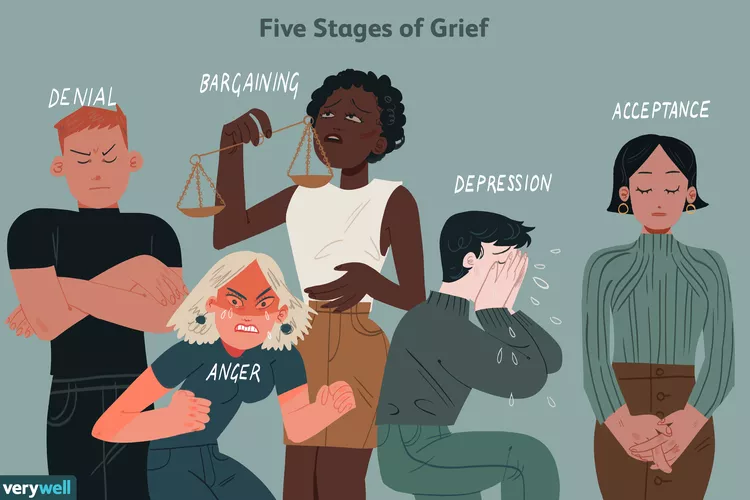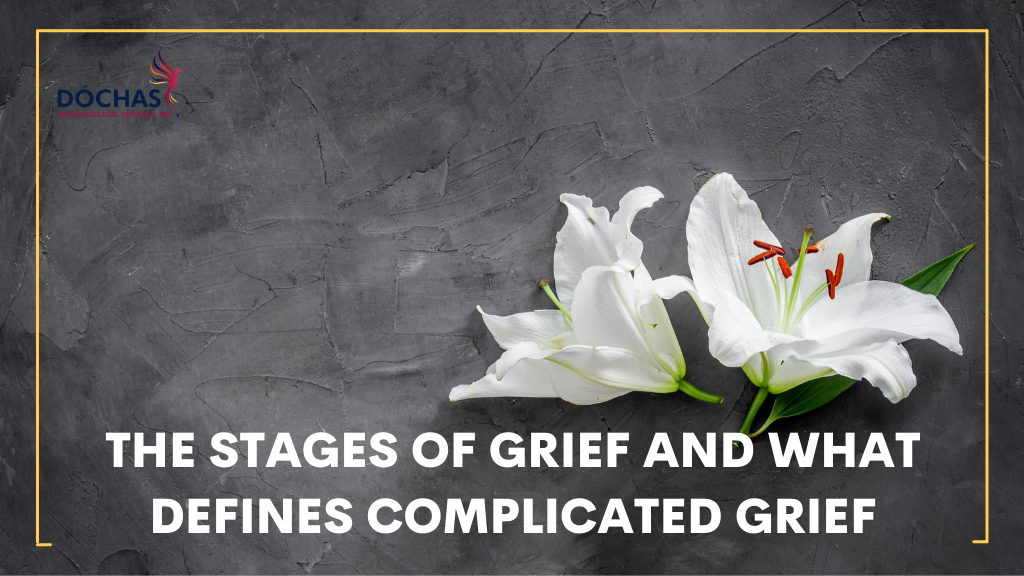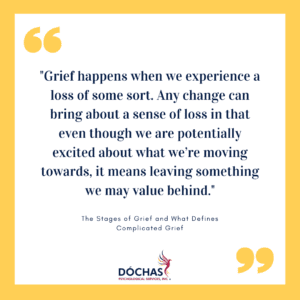Hey there, it’s Kim here on the Dóchas blog, and today we’re going to dive into a topic that touches us all: grief. And I’m going to go a bit deeper and dive into what defines complicated grief.
Do you remember that scene in Steel Magnolias where Sally Field’s character is raging about her grief after the funeral and how they went from crying to yelling to laughing and back again? It’s a classic example of how grief can make us feel like we’re on a rollercoaster, and it’s totally normal!
Whether it’s the loss of a loved one, a job, a relationship, or a way of life, we all experience grief in some form or another. Today, we’ll be exploring the different stages of grief and taking a closer look at the difference between “normal” grief and a more complicated kind of grief known as prolonged grief disorder.
What is Grief and How Does it Occur
Basically, grief happens when we experience a loss of some sort. This loss could be related to death, a relationship change, or even events we think of as positive, like retirement or graduation and leaving home. Any change can bring about a sense of loss in that even though we are potentially excited about what we’re moving towards, it means leaving something we may value behind. That sense of missing someone or something is a basic definition of grieving.
Stages of Grief
Back in the day, Elisabeth Kubler-Ross created the now well-known stages of grief. These are denial, anger, bargaining, depression, and acceptance. Denial is exactly how it sounds; we don’t want to acknowledge the loss, so we don’t look at it. Anger is often due to the lack of control we feel about the loss or we feel angry the loss is even occurring. It’s a sense of abandonment for something to end and that ticks us off. Bargaining is the wishing that can happen, like, “If I just exercise more or eat the right things, cancer won’t kill me” or “If I just ignore what I need in the relationship, we’ll make it work.” It’s the “if only’s” and “what ifs”. Depression is the sadness felt as we begin to fully acknowledge the loss in the present. It’s the movement toward acceptance. And acceptance is recognizing the reality of the loss. It’s NOT saying it’s okay or that everything is fine or that you’re over it. It’s accepting the situation happened and that it really sucks.
Here’s a great resource that will walk you through the Stages of Grief.

Here’s the thing, though. Ms. Kubler-Ross, in later years, has stated she wished she didn’t call it stages of grief. Grief doesn’t move in stages; it’s a flow forward and then back. It might jump over one element and then return to it. Grief also doesn’t fully end. We don’t stop missing the person or the thing, rather, we might feel less strongly about it. There’s a great visual about it, which can be found here: Why grief is like a ball in a box.
Basically, at first, the ball in the box (representing grief) is too big and it always hits the button that is in the box that represents the feeling. As we process the loss (or whatever emotion it is), the ball becomes smaller, so it hits the button less often. It doesn’t mean the feeling goes away; it just means it’s not pressed as often. And that’s the eventual goal; not to forget, but to remember without as much pain.
“Regular” Grief vs. Complicated Grief
Interestingly enough, or maybe it’s just me, our diagnostic manual has recently recognized the idea of complicated bereavement or a “Prolonged Grief Disorder”. But how is this different from “regular” grieving? Are we just pathologizing a healthy process?
Definitely not the goal. So, the manual has set some time limits on it. The grieving has to have occurred for longer than 12 months (6 in kiddos and adolescents), there is an intensity to the longing for the person and a preoccupation with thinking about them, and a disrupted grieving involving three of the following: feeling like you died too, disbelief, avoidance of reminders the person is dead, intense emotional pain related to the death, difficulty being involved in other relationships and activities, emotional numbness, a sense of life being meaningless, and intense loneliness. In addition, it has to cause significant impairment in social, occupational, or other areas of functioning and it has to be outside of expected social, cultural, or religious norms for the person’s context. Yep, italicized it for a reason. This is the key difference between “regular” grief and something more clinical in nature. It has to interfere with someone’s daily life and it has to be strange when compared to the norms of the society or culture the person most identifies with.
I’ll be honest, though, I have some issues with this initial proposal, although I am thankful there is a recognition of when grief is a problem. First, the timeline. Not sure who chose 12 months, and it is a starting point, but for some, 12 months can be a drop in the bucket if they are caught up in the administration that follows a death or other loss. That paperwork can really interfere with someone’s ability to take the time to process the event. Second, the diagnosis only focuses on loss through death instead of the other losses that can come with life. Again though, this is a starting point. I’m hopeful there will be an acknowledgement of these other events to help reduce the stigma people can feel if they are struggling with those other situations. But loss through divorce or relationship ending, loss of employment (particularly if you over-identify with your job or were in a “band of brothers” situation), loss of a sense of identity, and losses due to health concerns, among others, are also situations that can trigger an intense grieving, in my opinion.
So, What Now?
Listen, I’m not trying to create an illness where there isn’t cause to be diagnosed with anything. Not a fan of labels as they can sometimes cause dismissiveness of what someone is experiencing. Like, you know, the whole, “Oh, he’s just grieving.” Ugh. However, I think it is important to recognize when someone might need a little extra support. Some things to consider:
- Let the person repeat the stories about their loved ones. They are often trying to make sense of what’s happened and that’s why they are repeating it. You don’t have to do anything about it but listen.
- There isn’t really a timeline for grief. Some days will be better than others. Some days might hit you out of the blue years later. Remember the box analogy though… it should get easier!
- There isn’t a “right” or “wrong” way to grieve. Do what fits you… as long as it’s legal. Just saying.
- The hardest part for people grieving is when the initial crisis is over and everyone goes back to their daily lives. This is when loneliness can set in. It’s ok to check in and ask about it. Chances are the person was already thinking about it and, if they don’t want to talk about it, they’ll tell you. That’s not on you to make that decision for them.
- Most grief responses are “normal” and healthy. Letting yourself feel whatever it is you feel is the way you move through. It’s human to grieve.
Ok, I think that’s it for now. If you or a loved one is really struggling with the grieving process or if you just want to check in to ask questions about loss, I encourage you to reach out and ask us how we can help. You can reach out to us here by calling us at 780 446 0300 or emailing info@dochaspsychologicalservices.com.
In the meantime, take care of yourself!
About Dóchas Psychological
Dóchas Psychological Services is a well-established and trusted therapy clinic located in Spruce Grove, Alberta. At Dóchas we value the idea that everyone deserves a safe space. Through connection and education, our team works hard to build a trustworthy relationship with each of our clients. It is our goal to create a community for our clients to feel like they belong.
Disclaimer
Information provided through Dóchas Psychological Services blogs or vlogs is meant for educational purposes only. They are NOT medical or mental health advice. You can read more about our disclaimer here.











